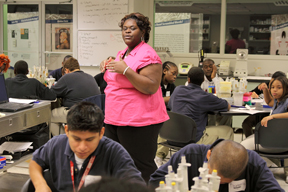It’s just after lunch when the students begin making their way back into the GENEius laboratory in the McWane Science Center, and Sabrina Walthall, Ph.D., is ready to impart another lesson on life.
 |
| Sabrina Walthall gives area high-school students a lesson on molecular biology in the GENEius laboratory in the McWane Science Center. |
“Why do you want your picture taken?” Walthall asks the student. “Tell me what you’ve done today that warrants you getting your photo taken.”
Her retort catches the high-school student off guard, but it’s clear by his smile that he’s OK with that. Walthall is quick and sharp in her responses, and she has earned the respect of the 20 area students in the room who are visiting the lab for a day as part of UAB’s Center for Outreach and Development’s (CORD) GENEius Program.
GENEius is a laboratory experience in molecular biology and genetics for high-school biology students. The program is a collaboration between CORD, Birmingham City Schools and the McWane Science Center. Grant support comes from a Science Education Partnership Award (SEPA) from the National Institutes of Health’s National Center for Research Resources, the Alabama Commission on Higher Education and UAB’s Center for AIDS Research.
At GENEius, students engage in challenging, daylong, hands-on experiments in which they explore molecular biology. Walthall directs the program. She is responsible for providing the students with a brief glimpse into molecular biology and its influence on the future of science, medicine and everyday life. By these experiences she inspires excitement for studying science. Her goal is to convince these students that an exciting career in science is within their reach; of this, she is certain.
Powerful message
Walthall also directs the sister BioTeach program, which trains area science teachers in molecular biology, and she visits area schools spreading her love for science. She takes her lab toys and expounds on the virtues of science — especially lab-based science — and tells the students about the many possibilities they have for a professional future in the field.
Walthall learned that for herself an early age while growing up in the Southside Homes project in Bessemer, a rough-and-tumble neighborhood filled with drugs, violence and little hope. She was fortunate. Her grandmother Catherine Johnson and two elementary school teachers pushed her to excel and wouldn’t let her accept failure — not in the classroom or circumstance. It’s a message she shares in the classroom at McWane and countless high schools across Birmingham.
“I really try to talk to the students about not allowing their circumstances to affect where they will end up in life, because I understand how it is,” Walthall says. “I talk about that because those are things I’ve gone through.”
“I tell these kids to have that inner voice of their own that says ‘I want this. I really want to do this, and I can do it.’ You have to continuously fight for what you want.”
‘We can do better’
Walthall says her grandmother always stressed to her that life extended well beyond the end of her street. She viewed living in the projects as a short-term option.
“I wasn’t raised to think, ‘This is what you have, this is what you’re going to do and this is all we’re going to do — have kids and live here,’” she says. “I was taught, ‘This is what we’re doing for the moment, but we can do better.’ She always pushed me to do better and be better. If I brought home a B, she’d say that was good, but what about an A? What could I have done to get an A? I always thought about that afterward.”
It was no surprise then that Walthall had her grandmother’s full support when she left Jess Lanier High School during her junior year to join the inaugural class of the Alabama School of Math and Science. Walthall received her undergraduate from Emory University in Atlanta before applying for graduate school at UAB. In August 2006 she received her Ph.D. in biochemistry and molecular genetics.
“It was a blessed day,” she says. And it’s also a powerful message she can deliver to area students and teachers.
“Sabrina is just unbelievable in her outreach to both students and teachers,” says Mike Wyss, Ph.D., director of CORD. “She’s a tremendous role model for these young children. She shows them all they can make a difference in science. Just as important, she shows graduate students and postdoctoral fellows who facilitate GENEius that they can make a difference throughout their careers.”
And that is how Walthall gets her greatest thrill. She wants every student to believe something greater is in their future and fight for it.
A young man approached her after a genetics class she taught as a GK-12 Fellow with CORD at Carver High School and said, “I didn’t like science as much until I met you. I really like it now, and I plan on majoring in it in college.” His words overwhelmed her. Today, that student is a biology major at Tuskegee University.
“To have that kind of an impact on a student really makes you feel good,” she says. “That’s what you want, to get at least one to say, ‘OK, if she did it, I can do it.’ That’s the best thing.”